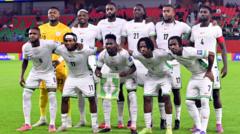Is Nigeria Ready to Redefine Its Strategy After World Cup Qualifying Setback?

Published: 2025-11-17 15:00:27 | Category: sport
Nigeria's absence from the 2026 World Cup, despite being ranked the fifth-best team in Africa, highlights a disjointed qualifying campaign marred by managerial changes and internal strife. The Super Eagles, featuring talents like Victor Osimhen and Alex Iwobi, could not secure a spot at the finals after a disappointing defeat to DR Congo in the play-off final. This article delves into the factors that led to Nigeria's failure, the implications for the Nigeria Football Federation (NFF), and what lies ahead for the national team.
Last updated: 16 October 2023 (BST)
What’s happening now
As Nigeria comes to terms with missing out on the 2026 World Cup, the national team faces a period of reflection and potential restructuring. Fans are expressing their disappointment on social media, reflecting a growing frustration with the football administration and the team's performance. The NFF is now tasked with addressing both the managerial situation and the underlying issues in Nigerian football that have contributed to this failure.
Key takeaways
- Nigeria's failure to qualify for the 2026 World Cup is a significant disappointment for fans and players alike.
- The disjointed qualifying campaign featured two managerial changes and a player boycott over unpaid allowances.
- Victor Osimhen's injury highlighted the team's reliance on key players for success.
Timeline: how we got here
The path to Nigeria's World Cup absence has been fraught with challenges:
- November 2021: Nigeria begins their World Cup qualifying campaign, placed in Group C alongside South Africa, Benin, Zimbabwe, Rwanda, and Lesotho.
- March 2024: Manager Jose Peseiro's contract ends after guiding Nigeria to the Africa Cup of Nations final.
- June 2024: Finidi George takes over but struggles with the squad, leading to disappointing results.
- January 2025: Eric Chelle appointed as head coach, tasked with leading Nigeria's World Cup bid.
- October 2025: Nigeria's World Cup qualifying campaign ends with a penalty shootout loss to DR Congo.
What’s new vs what’s known
New today/this week
The immediate fallout from Nigeria's failure to qualify includes increased scrutiny on coach Eric Chelle and the NFF's governance. Fans and pundits are urging for a thorough evaluation of the team's structure and management ahead of the 2025 Africa Cup of Nations.
What was already established
Prior to the recent developments, Nigeria had struggled with internal discord, including player boycotts and managerial instability. These issues have been long-standing and have contributed to the Super Eagles' inability to perform consistently on the international stage.
Impact for the UK
Consumers and households
While Nigeria's absence from the World Cup may not directly affect UK consumers, it could influence the diaspora community's engagement with the tournament. Football fans in the UK, particularly those of Nigerian descent, may feel a void during the event.
Businesses and jobs
The implications for businesses linked to football, such as merchandise sales and broadcasting, could be felt as well. Brands that rely on the visibility of the Super Eagles during major tournaments may need to recalibrate their strategies.
Policy and regulation
The NFF's governance issues could attract attention from sports regulatory bodies in the UK, especially if they seek partnerships or sponsorships in the future. The failure to qualify may prompt discussions on reform within football associations in Africa.
Numbers that matter
- 5: Nigeria's ranking in Africa, showcasing their historical strength in the sport.
- 3: The number of World Cups Nigeria has participated in (1994, 1998, 2002).
- 8: Goals scored by Victor Osimhen in the qualifying campaign, underscoring his importance to the team.
- 4: The number of managerial changes since the start of the qualifying campaign.
- 1: The number of penalties missed in the crucial play-off match against DR Congo.
Definitions and jargon buster
- NFF: Nigeria Football Federation, the governing body for football in Nigeria.
- Super Eagles: The nickname for the Nigeria national football team.
- Afcon: Africa Cup of Nations, the main international football competition in Africa.
How to think about the next steps
Near term (0–4 weeks)
The immediate focus will be on assessing the current coaching staff and the players' readiness for the upcoming Africa Cup of Nations. The NFF may consider changes in leadership to ensure a more stable environment.
Medium term (1–6 months)
In the medium term, Nigeria must invest in grassroots programmes and improve local football infrastructure to nurture young talent. This could involve partnerships with European clubs to enhance training facilities.
Signals to watch
- Results from the upcoming Africa Cup of Nations and any managerial changes announced by the NFF.
- Player performances in both domestic and international leagues as Nigeria looks to rebuild.
- Any announcements regarding investment in Nigerian football infrastructure.
Practical guidance
Do
- Support local football initiatives aimed at improving youth training opportunities.
- Engage with the NFF to express concerns and suggestions for improvement.
- Monitor the performance of Nigerian players in international leagues for future selections.
Don’t
- Ignore the governance issues within the NFF that need urgent attention.
- Overlook the importance of player welfare and incentives for performance.
- Dismiss the potential for positive change following the recent failures.
Checklist
- Assess the performance of the national team in the upcoming Africa Cup of Nations.
- Evaluate the effectiveness of the current coaching staff.
- Follow discussions regarding investment in football infrastructure.
- Stay informed about player transfers and developments in European leagues.
- Engage with local football clubs and support youth programmes.
Risks, caveats, and uncertainties
The future of Nigerian football remains uncertain, with ongoing governance issues posing risks to the national team's performance. The NFF's ability to implement effective changes is crucial, but without tangible improvements to management and player support, the path forward could be fraught with challenges. Furthermore, the impact of external pressures, such as competition from other African nations, will be significant as Nigeria aims to rebuild.
Bottom line
Nigeria's failure to qualify for the 2026 World Cup serves as a stark reminder of the challenges facing the Super Eagles. Addressing internal governance issues and investing in football development are essential for the future of the national team. As the NFF contemplates its next steps, the hope remains that Nigeria can return to the World Cup stage by 2030, drawing lessons from this setback.
FAQs
Why did Nigeria fail to qualify for the 2026 World Cup?
Nigeria failed to qualify for the 2026 World Cup due to a disjointed qualifying campaign that included managerial changes, player disputes, and poor performance, culminating in a penalty shootout loss to DR Congo.
What are the implications for Nigerian football?
The implications for Nigerian football include a need for structural reforms within the Nigeria Football Federation, investment in local facilities, and a focus on player welfare and development.
When is Nigeria's next major football tournament?
Nigeria's next major football tournament is the Africa Cup of Nations, which kicks off on 23 December 2023 against Tanzania, providing an opportunity to regroup and refocus.



